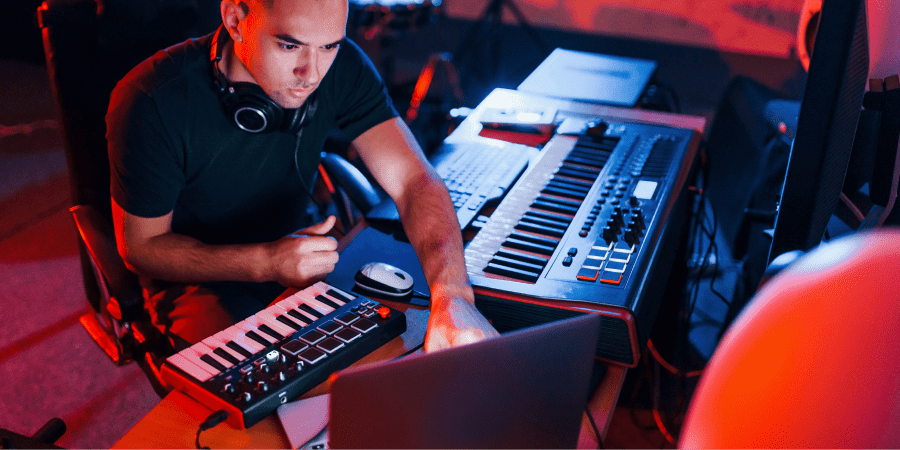Do you like listening to music? Do you consider yourself to be somewhat of a musical virtuoso? Do you happen to be a people person? Well then, a music producer is the most accurate career option for you. But before you embark on this journey to become an award-winning music producer, you must have a few must-have skills in your repertoire.
Mastering these skills will launch you straight into the hall of fame if you play your cards right. So, without further ado, let’s discuss these skills and how to go about receiving them.
Mugafi Ved – AI Storywriting tool
Knowing How to Play an Instrument
Let’s start from the basics. Being a music producer, you should have exceptional musical dexterity. Learning to play an instrument will accomplish this greatly. You should have expertise in at least one musical instrument.
If you like playing around with the black and white keys of a piano; take piano lessons from an acclaimed pianist. If it’s the strings you are inclined towards, pick anything from guitar to violin or sitar or the cello. If sticks are more up your alley, pick up the drums.
Mugafi Ved – AI copilot for writers
It can be anything that you are inclined towards. Just make sure you’re well versed in at least, preferably more than that. Learning how to play an instrument will enhance your musical knowledge and provide a comprehensive understanding of music. So that when you get to the production part, things will sail over smoothly because you would have mastered the music theory.
Having Astute Communication Skills
You can not discount the importance of communication skills if you wish to pursue a career in music production. They will come in handy at every stage of music production. Whether it is while developing profitable connections, or translating what you want to your lyricist or singer, communication skills will always be vital.
Music producers are often entrusted with the task of bringing everything and everyone together to create a masterpiece. You will have to assemble people from various walks of life. Audio technicians, artists, musicians and even other studio staff; all are involved in the product you wish to create. For things to go smoothly, you will need to get everyone on the same page.
Even speaking through your body language is an art that you must learn. There are nuances to communication that you need to master to become a wholesome music producer. You should be so adept that people hang on your every word.
Knowing Music Production Tools and Software
Mastering the essentials of the hardware and the software that is at work in your music studio is key. You must know your music studio inside out. Having a keen understanding of all the music equipment and the whole set-up of your studio is a must. You must be well acquainted with the monitors, preamps, microphones, DI boxes, MIDI controllers, outboard gear, etc.
Tinker around with all the gear that is involved in music production. Reading the manuals of your gear carefully is climbing one step closer to being an expert with your equipment.
Speaking of software, a Digital audio workstation or DAW occupies the throne in your music studio. So, what is DAW? DAW basically stands for the predominant music creation software you will use for your studio. There are a lot of options from which you can choose. There’s Cubase, Ableton Live, Sonar, Reaper, FL Studio, Logic Pro, Pro Tools, etc.
If you want to create award-winning music, conquering your DAW is the foremost task you should concern yourself with. Your digital music production relies greatly on your chosen DAW. So tread carefully while selecting one.
Along with the DAW, your choice of audio plug-ins should be well thought out and impeccable. Plugins and DAW are intricately woven. Plug ins are something you load up in your DAW. Plugins are known by a lot of other terms as well. These are VSTs (Virtual Instruments), Soft Synths, MIDI, Samplers, etc. And DAWs are also called VST Hosts.
While we have explained the importance of choosing a DAW for your studio, you must also be acclimated to using other DAWs because it’s not just your studio you will be working at. Collaborative projects are more common now than ever. Things will sail smoothly if you have a basic understanding of most software but elaborate expertise of your own.
Being Tech Savvy
As a music producer in the digital world, most of your music is being produced digitally using various kinds of software. Having a sophisticated understanding of the software at play and being tech-savvy in general have been known to further many music producers’ careers.
While picking a DAW as explained earlier, you will need expertise in the subject. This may be supported by your tech-savvy disposition if you have one. If you find yourself to be lacking in this department, there’s a cure to it. There are various academic courses available online as well as in-class that will cover the basics you will need along the course of your career. And being able to work with technology well is a completely learned skill, so there’s no need to worry.
Being a Financial Ninja
As a music producer, you are not just entrusted with the task of creating original never-heard-before music but also overseeing a piece right up to its release. When it comes to releasing a creation of yours, you will not just deal with artists but also with business people, lawyers, etc.
The financial and legal aspects of releasing a song come with their own set of challenges. If you wish to overcome these, you will need some expertise outside of your music studio. Being well versed in dealing with numbers is a skill that will always come in handy. While producing a piece, things like cutting cost and sticking to your budget so as to save money for the studio’s financial future also falls in your territory.
Not only this but having some degree of legal knowledge wouldn’t hurt, too. Because some or the other contract is always binding you with multiple people, a polished legal proficiency will benefit you greatly.
Having Killer Negotiation Skills
The art of negotiating is something we pick up along the course of our lives. And this rewarding skill reaps benefits no matter which line of work you are in. You are probably negotiating at every step of your creation.
Negotiating over the cost of studio time, how much you are going to pay your artists, and what royalties you are willing to dish out once the label is released. You must negotiate while being civil, concise and clear.
However, you must not place outrageous demands in front of the other party and meet them halfway. You don’t want to antagonize the people you work with by being too tight with your purse strings. Know when to negotiate and when to cease it.
Negotiating well also comes under the umbrella skill of communication, whose importance we have already highlighted in this blog.
Learning Music and Production Theory
You need to ace your music and production theory if you wish to be an acclaimed music producer. The way you need to master anatomy in order to become a doctor, similarly knowing you’re A to Z in music theory is important for a music producer.
Having a consummate understanding of time signatures, scales, intervals, beats, notes, chords and chord progressions is all a part of it. Do you know how they first teach theory in school before letting you perform a practical? Well, the case is comparable here. Before you buy a big ass studio, download a lot of software and install all the equipment, and master your music theory.
Knowing the essentials of arrangement theory like song structures, sections, its lyrics and the melody, all of this comes under music theory. The musical arrangement takes the spotlight when it comes to dictating the excellence of your musical composition.
In this digital age, the terms you should concern yourself with if most of your production occurs digitally are:
- Audio
- MIDI
- Gating
- Distortion
- Phasing
- Mixing
- Programming and Synth programming
- Reverb
- Equalization
- Compression
- Acoustics
All of this vocabulary is a must-have in your dictionary if you wish to be a recognized music producer.
Getting Ear Training
Ear training is an inherent part of being a music producer. You need to develop an ear for recognizing different kinds of notes, chords, intervals, etc. You also need to be able to single out the problematic areas in your recorded audio. For quality productions to take place at your studio, the right kind of ear training is necessary.
When it comes to ear training, two types of listening have been described; critical listening and analytical listening. Critical listening pertains to the physical details of a song. It overlooks the suaveness of all the mixing elements, the blending of instruments, and the tone of each. Your technological endowment can be put to good use here.
Why do some songs even after being perfect technically lack that lustre needed for every heart touching song? This is where analytical listening comes into play. Analytical listening supervises the overall feel and meaning of the song. It weighs the art behind a particular mix and how transcending it is.
Some music producers train themselves to the degree that they can transcribe songs just by using their ears. If you want to make the winds shift with your music production and take the industry by storm, you need to get a lot of ear training practice.
Read more: How to take care of your voice?
Teamwork and Leading a Team
As a music producer, you’re both leading and a part of the team. This dual role can be tricky to play because you don’t want to seem like an overbearing boss but you also don’t want to let your reins too loose. Finding a middle ground with your subordinates where they are willing and happy to work with you is ideal.
Respecting your co-workers, listening to their ideas and involving them in every stage of the production would help you build a good rapport with them.
Now that we have briefed you about various skills that a music producer has in their stack, it’s time for some self-evaluation. Which skills do you lack? How can you go about learning them? Is there a way to hone them? These are some of the questions you must ask yourself to get ahead in your professional trajectory.
Music production is a deeply satisfying field and if you have your goals set on becoming a producer, having all the training you can get is vital. That’s where we come in. Unlu Singing Fellowship is a 3-month long multi-teacher program where you get an opportunity to learn straight from experts like Monali Thakur, Shivam Katoch, Jishan Ali, ShibaniKashyap and the likes. You will also gain lifetime access to Unlu community which is a platform for all genres of artists. Here you can build meaningful connections, collaborate with different fellow artists and benefit from peer-to-peer learning. What more does an aspiring music producer want? So sign up for our Singing Fellowship now!







